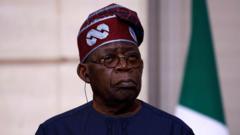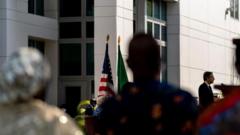The growing dominance of President Bola Tinubu's Yoruba ethnic group in key government positions threatens Nigeria's historical balancing act of ethnic representation, prompting widespread criticism and concerns for national unity.**
Concerns Grow Over Ethnic Bias in Nigeria's Presidential Appointments**

Concerns Grow Over Ethnic Bias in Nigeria's Presidential Appointments**
Nigeria's delicate ethnic balance faces scrutiny as President Tinubu's appointments raise alarms among diverse groups.**
In Nigerian politics, a delicate balance among the country's diverse ethnic and religious groups has traditionally played a crucial role in fostering national cohesion. However, recent actions by President Bola Tinubu have sparked mounting concerns that this balance is being upended.
While Nigeria's constitution explicitly requires regional representation in cabinet roles, there has been an unspoken convention aimed at ensuring that other prominent positions reflect the nation’s ethnic mosaic. With over 250 ethnic groups—predominantly Hausa-Fulani, Igbo, and Yoruba—this careful juggling act has been vital to maintaining order in Africa's most populous nation, which has experienced fractures in the past.
Tinubu, who has held the presidency for just over two years, faces criticism for perceived favoritism toward his Yoruba kin, a charge his administration firmly denies. The initial stages of his presidency, marked by the selection of a Muslim running mate at a time when the expectation had been a balanced Muslim-Christian ticket, set the tone for scrutiny over his subsequent appointments.
The president has filled the eight most critical positions of his administration—central bank, state-owned oil company, police, army, customs service, intelligence agency, anti-corruption agency, and revenue service—with individuals exclusively from the Yoruba ethnicity. This unprecedented dominance has alarmed many Nigerians, especially those from the north, who fear that the ethnic pursuance could deepen divisions within the populace.
Political analysts have highlighted Tinubu's choices as a departure from the more balanced appointments of his predecessors. Former leaders, Goodluck Jonathan and Muhammadu Buhari, managed to integrate a diverse range of ethnic backgrounds into their administrations at similar points in their terms. Jonathan’s cabinet included representatives from various ethnic groups while Buhari, despite perceived biases, did not exhibit the same level of ethnic homogeneity now evident under Tinubu.
Moreover, the recent appointment of Bayo Ojulari to lead the Nigerian National Petroleum Company, replacing a northerner, has intensified debates regarding ethnic favoritism. Critics warn that if such trends continue, it could undermine the sense of belonging among non-Yoruba groups and erode confidence in Nigeria's democratic principles.
Even within Tinubu's own political party, the All Progressives Congress, dissent is surfacing. Senator Ali Ndume has openly criticized the lack of inclusivity in appointments, deeming them inconsistent with the president's "Renewed Hope" agenda. A presidential aide attempted to justify the administration’s approach to ethnic representation, claiming a commitment to fair distribution across regions, yet discrepancies in reported figures have eroded public trust.
With rising accusations and discontent brewing among various ethnic factions, the future political landscape of Nigeria remains uncertain. Historians suggest that true ethnic neutrality may only come about through successive leadership prioritizing broader representation—a vision many hope will be realized in future administrations. As Nigeria grapples with these challenges, the need for unity and inclusiveness has never been more essential.





















